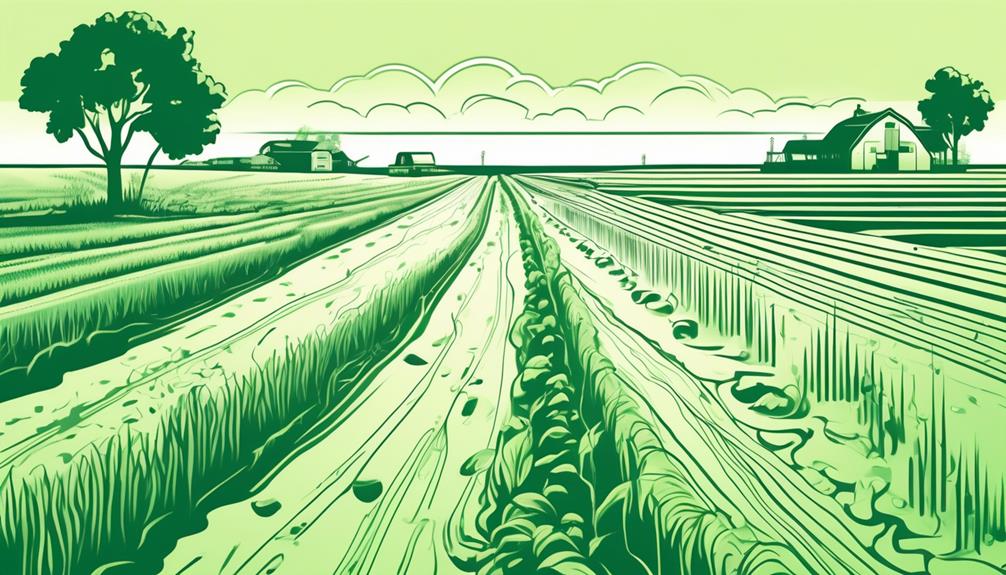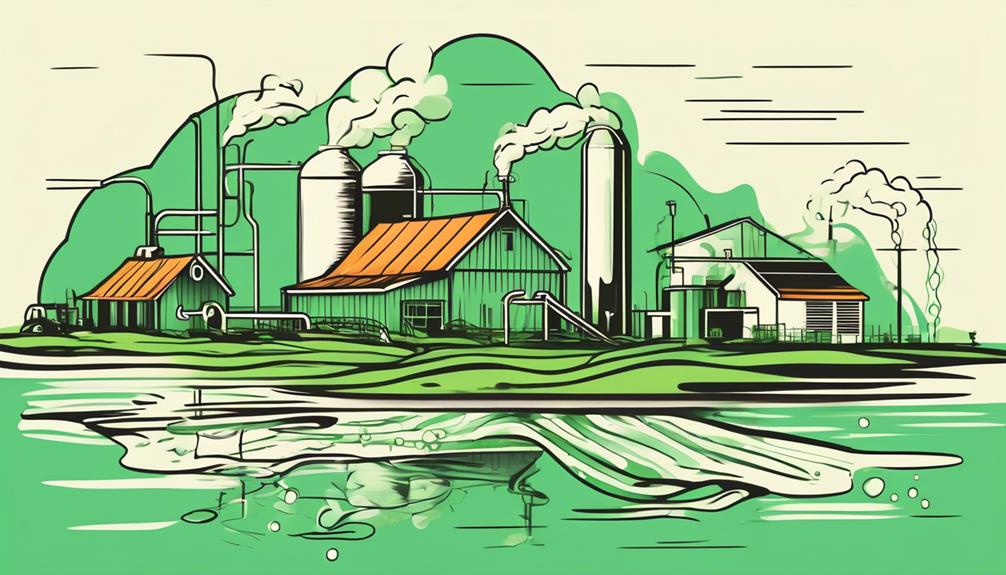Imagine a vast interconnected web where agriculture and water pollution dance hand in hand, shaping the very essence of our environment. As you observe this intricate tapestry, you begin to unravel the 8 key links that bind these two entities together, each link painting a picture of how our farming practices impact the quality of our water resources.
From the toxic embrace of pesticides to the nutrient overload from fertilizers, the journey through these connections reveals a story of challenges and consequences we must face. Each link holds a piece of the puzzle, urging you to explore further and discover the solutions that can untangle this complex relationship for a sustainable future.
Key Takeaways
- Excessive fertilizer use in agriculture leads to harmful algal blooms and nutrient pollution in water bodies.
- Proper waste management and sustainable agricultural practices are crucial for minimizing water contamination from agriculture.
- Collaborative efforts and effective regulation are essential for managing contaminants like pesticides and emerging pollutants in water systems.
- Implementing strategies such as contour plowing, vegetated buffers, and efficient irrigation practices can help control runoff and sedimentation, protecting water quality.
Agriculture's Impact on Water Quality
Agriculture significantly affects the quality of water due to its extensive use of irrigation and the resulting runoff pollution. Imagine vast fields being watered, chemicals and fertilizers being applied, and excess water carrying pollutants into streams and rivers. In the United States, agricultural activities are the leading cause of water quality issues in surface water bodies. The impact of agricultural water pollution is evident, with eutrophication and disruptions in aquatic ecosystems becoming more prevalent.
The environmental consequences of agricultural practices extend beyond just water pollution. By accounting for 70% of water use globally, agriculture puts a strain on water resources. Sustainable water management is crucial to ensure that farming can continue to meet the world's food demands without compromising the health of our water systems. Through proper irrigation techniques, reduced chemical usage, and responsible waste disposal, the agricultural sector can mitigate its impact on water quality and safeguard the environment for future generations.
Pesticides and Water Contamination
Pesticides wielded in modern agriculture pose a significant threat to water sources by contaminating them through runoff and leaching. This contamination stems from the use of agricultural inputs like pesticides on vast agricultural lands. The consequences of pesticide use on water quality include detrimental effects on aquatic ecosystems and potential health risks for humans.
- Impact on Water Quality:
- Pesticides can seep into water bodies, compromising water quality and aquatic life.
- Prevention Measures:
- Implementing best management practices like precision application and buffer zones can help reduce pesticide runoff into water resources.
- Regulation and Collaboration:
- Monitoring and regulating pesticide use in agriculture are crucial steps in preventing water pollution. Collaboration among farmers, policymakers, and researchers is essential to develop effective solutions for reducing pesticide-related water contamination.
Fertilizers and Nutrient Pollution
Hey there!
Let's talk about fertilizers and how they can cause nutrient pollution in water.
When excess nutrients from fertilizers enter water bodies, they can lead to harmful algal blooms.
This can disrupt the natural balance of aquatic ecosystems and harm water quality.
Excess Nutrient Runoff
When fertilizers are overused in farming practices, they can lead to harmful nutrient runoff that pollutes water sources. This excess nutrient runoff, primarily from nitrogen and phosphorus, poses a significant threat to water quality. Here's how it impacts the environment:
- Nutrient runoff from agricultural production, including livestock and poultry manure, flows into rivers and streams.
- This pollution can cause eutrophication, harming aquatic ecosystems.
- Managing nutrient loss through sustainable development practices is crucial to safeguard water quality and promote sustainable agriculture.
Harmful Algal Blooms
Excessive fertilizer use in agriculture contributes to the formation of harmful algal blooms through nutrient pollution. When nutrients like nitrogen and phosphorus from fertilizers enter water bodies, they act as a fertilizer for algae, causing them to multiply rapidly. These algal blooms can harm water quality, deplete oxygen levels, and produce toxins dangerous to aquatic life and humans.
With the increasing water pollution from agricultural practices, harmful algal blooms have become one of the leading causes of water contamination. To combat this issue, it's crucial to improve agricultural practices, manage fertilizer use effectively, and reduce nutrient runoff. By addressing the sources of nutrient pollution, we can help prevent the detrimental effects of algal blooms on ecosystems and human populations.
Livestock Farming and Water Quality
Hey there!
Let's talk about how runoff from pastures and waste management strategies play a big role in livestock farming's impact on water quality.
When rainwater washes over pastures, it can carry manure and other pollutants into nearby water sources, affecting their quality.
Proper waste management practices are essential to prevent these contaminants from reaching our water bodies and safeguarding their health.
Runoff From Pastures
Runoff from pastures, particularly due to livestock farming activities, significantly impacts water quality by introducing pollutants like animal waste, nutrients, and sediments into water bodies.
To better understand this issue, consider the following:
- Land Use Change: Conversion of natural land to pastures increases runoff risks.
- Management Practices: Implementing strategies like vegetated buffers can help trap pollutants before they reach water bodies.
- Animal Manure: Proper handling and disposal of manure is crucial to prevent contamination of water sources.
Waste Management Strategies
Implementing effective waste management strategies in livestock farming is crucial for maintaining water quality and minimizing environmental impact. Proper manure management practices are essential to reduce nutrient and pathogen runoff, safeguarding water quality.
Utilizing anaerobic digesters can help convert manure into energy and decrease environmental consequences. Establishing riparian buffer zones along water bodies acts as a natural filter, reducing pollutants flowing from farms.
Rotational grazing techniques prevent overgrazing, soil compaction, and nutrient loss into water sources. Cover crops play a vital role in reducing soil erosion, nutrient runoff, and enhancing water quality.
Irrigation Practices and Runoff

To minimize water pollution from agriculture, you must carefully manage your irrigation practices to prevent harmful runoff. When it comes to irrigation practices and runoff, here are some key points to consider:
- Proper Irrigation Management: Ensure efficient use of irrigation water to reduce runoff, maintaining water quality in the source.
- Prevent Soil Erosion: Implement techniques like cover crops or conservation tillage to prevent soil erosion, which can contribute to sedimentation in water bodies.
- Control Runoff: Implement strategies such as contour plowing or buffer strips to control runoff and minimize the transport of pollutants like pesticides and fertilizers into water bodies.
Soil Erosion and Sedimentation in Water Bodies
As you minimize water pollution through careful irrigation practices, the focus now shifts to the impact of soil erosion and sedimentation on water bodies. Soil erosion from agriculture contributes to suspended loads in water bodies, altering hydrological cycles. This disturbance affects nutrient cycles, leading to nutrient loss and eutrophication in water bodies. Sedimentation overwhelms aquatic ecosystems, impacting water quality. Agriculture's runoff moves contaminants, including pollution from pesticides, into local streams, rivers, and groundwater, making it a significant source of water pollution. Excessive sedimentation caused by erosion is a primary cause of water quality impairment in rivers and streams. Implementing buffer zones can help mitigate soil erosion and sedimentation, providing benefits like improved plant growth and reduced nutrient loss. The table below summarizes the key impacts of soil erosion and sedimentation in water bodies due to agricultural activities.
| Impacts | Description |
|---|---|
| Altered hydrological cycles | Soil erosion affects water flow patterns in surface waters |
| Nutrient loss | Disruption of nutrient cycles leading to eutrophication |
| Water quality impairment | Sedimentation affecting aquatic ecosystems and water quality |
Agricultural Wastewater Disposal

Efficiently managing agricultural wastewater disposal is crucial for safeguarding water quality and preserving aquatic ecosystems and human health.
- Treatment Methods: Utilize constructed wetlands, lagoons, or filtration systems to reduce agricultural chemicals, nutrients, and organic matter in water.
- Sustainable Practices: Minimize nutrient runoff and chemical pollution to protect water quality.
- Importance: Proper disposal prevents water pollution, ensuring safe water resources for future agricultural production.
Emerging Contaminants From Agricultural Activities
Optimize water quality and protect ecosystems by addressing emerging contaminants from agricultural activities. These contaminants, including pharmaceuticals, antibiotics, hormones, personal care products, and engineered nanomaterials, can have significant effects on water quality and aquatic ecosystems. Unlike traditional pollutants, emerging contaminants aren't commonly monitored, making it challenging to assess their negative environmental impacts accurately.
Pathogens and emerging contaminants from agricultural activities can result in nutrient loss and pose risks to both ecological balance and human health. To safeguard water quality, it's crucial to identify and monitor these emerging contaminants effectively. Implementing a mix of regulatory, economic, and voluntary measures is essential to manage and mitigate the pollution caused by these contaminants in agricultural practices.
Frequently Asked Questions
How Is Water Pollution Connected to Agriculture?
Water pollution is linked to agriculture through runoff of agrochemicals, nutrients, and pathogens from farming activities. Excessive irrigation and livestock waste also impact water quality. Sustainable practices are vital to safeguard water resources and ensure a healthy environment for all.
What Are the Connections Between Agriculture and Water?
You impact water through agriculture. Your practices affect water quality, deplete aquifers, and alter ecosystems. Policies can incentivize better water management. Your choices matter. Be mindful of water's health and sustainability.
What Is the Key Link to the Increase in Water Pollution?
You know the key link to the increase in water pollution is agriculture. It's the biggest water user and a major polluter. Changes are necessary to prevent further harm, like reducing agrochemical discharges and unsustainable water use.
Why Is Water Quality Important in Agriculture?
Water quality is vital in agriculture to ensure healthy crops and livestock. Proper water management prevents contamination and supports sustainable farming. You must prioritize water quality for successful and responsible agricultural practices.
Conclusion
So there you have it, agriculture and water pollution are like two peas in a pod, causing a ripple effect on our environment and health.
It's time to plow the fields of change and sow the seeds of sustainable practices.
Let's water our future with conservation, reduce the pesticide storm clouds, and watch our rivers flow crystal clear once more.
Together, we can cultivate a brighter, cleaner tomorrow.
Let's make waves of change!